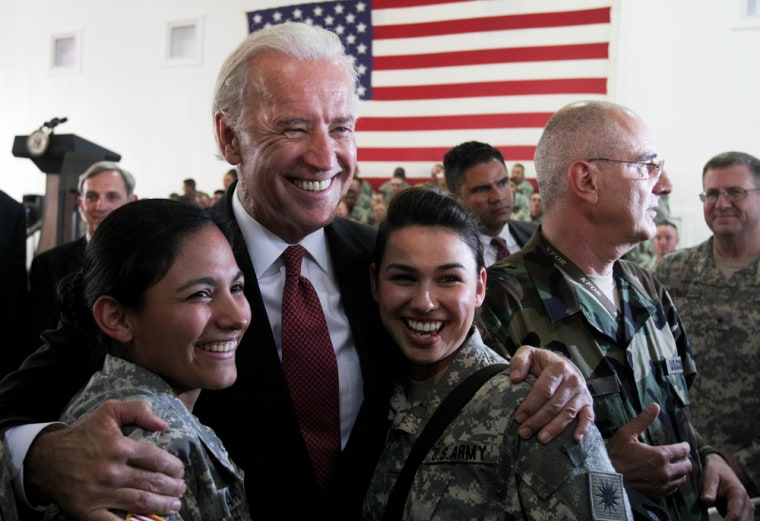U.S. Vice President Joe Biden on Thursday received a hero's welcome in the place where it was expected — among Kosovo Albanians who are thanking America for leading them to independence from Serbia.
But, his visit to Serbia a day earlier may have gotten the new Obama administration some unexpected allies — the Serbs, who oppose Kosovo's independence.
In Kosovo, Biden was wrapping up a three-day tour of the volatile southeastern European region that also included stops in Bosnia and Serbia.
The visit was meant to demonstrate renewed U.S. interest in the region riven by bloody ethnic wars of the 1990s, which the West accused Serbia of fomenting.
Not long ago, the Balkans were the focus of U.S. policies, but largely have fallen off the U.S. radar as attention has shifted to Afghanistan, Pakistan, Iraq, Iran, the Middle East and even Sri Lanka.
To add insult to injury, when the White House announced Biden's visit to Belgrade, it put out a press release, quickly withdrawn, saying he was going to meet Zoran Djindjic, Serbia's first pro-democracy prime minister, who was assassinated by nationalists in 2003.
'New interest in region'
Ivan Vujacic, until recently Serbia's ambassador to Washington, said Biden's visit shows "America's new interest in the region, although it definitely has larger priorities."
"Biden's main message in the Balkans was that the United States wants to see the region integrated into Europe," Vujacic said.
During his visit to Kosovo, Biden said the Balkans have "a historic opportunity" to become part of "a Europe that is whole, united and at peace."
Cheering and waving flags, thousands of ethnic Albanians lined the streets of Kosovo's capital, Pristina, to welcome Biden and applaud U.S. support for their country's statehood.
Biden, whose visit was the first by a senior American official since Kosovo declared independence last year, assured Kosovo's assembly that the country's independence — contested by Serbia and its ally Russia — was "irreversible." That prompted thunderous applause and a standing ovation by lawmakers grappling with challenges of nation-building amid ethnic tensions.
So far, Kosovo — considered by Serbs the cradle of their medieval state and religion — has been recognized by 60 states, including the United States and 22 countries of the European Union.
Kosovo, a tiny state of 2 million, has not yet been able to join the United Nations, but it has joined the International Monetary Fund.
Reliance on international support
Since the declaration of independence last year, Kosovo's government has failed to establish its authority in the Serb-dominated north and has relied heavily on international support to prevent ethnic partition of the country.
Biden rejected Kosovo's partition, but he also told the ethnic Albanians they had to reach out to Serbs.
"You have a special responsibility to overcome the legacy of division, bitterness, and fear and mistrust within your country," he said.
Biden visited a 14th-century Serbian Orthodox monastery, a U.N. world heritage site and one of great importance to Serbia's national identity. Biden is often credited for saving the church from destruction in 2004 riots when ethnic Albanians attacked Serbs and their religious sites.
In a confidential letter, Biden told then-Prime Minister Ramush Haradinaj that he was relying on him personally to guarantee the protection of the medieval monastery. About 30 Serbian Orthodox churches were burned during the riots, but Decani monastery was not targeted.
Serbia has vowed never to accept an independent Kosovo, and Serbian President Boris Tadic stressed the point in his comments after meeting Biden.
But Biden won unexpected sympathy from Serbia's pro-Western leaders for insisting Washington will not pressure Serbia into recognizing Kosovo's independence as a precondition for "a strong, new relationship" with the U.S., or for its support of Serbia's bid to join the European Union.
Nationalists Serbs opposed visit
Many in Serbia still view the U.S. as anti-Serb. The mistrust stems from the 1999 U.S.-led NATO bombing of Serbia that de facto ended the country's rule in Kosovo.
Nationalist Serb parties opposed Biden's visit, saying it amounted to a "humiliation" of the country. They accused Biden of being the chief advocate of the bombing and reject his suggestion that Serbia should become a member of NATO, the Western military alliance.
"There was absolutely no pressure," said Serb Defense Minister Dragan Sutanovac, who met Biden in Belgrade on Wednesday. "After this visit, I'm sure that our relations will be much better."
"Biden stressed several times that he fully understands our position," Sutanovac said. "He understands that it is hard for him to press us to become a NATO member, while at the same time he saw bombed out buildings in the center of Belgrade."
